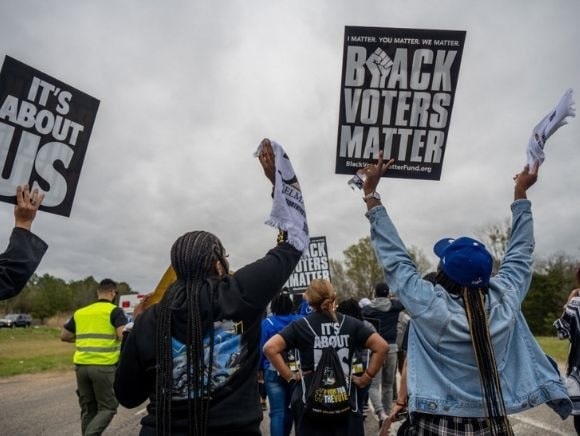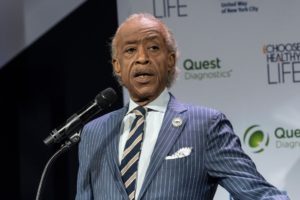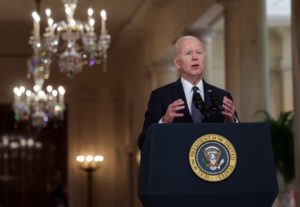
(Photo by Brandon Bell/Getty Images)
As if things couldn’t get worse for President Joe Biden, yet another poll shows he is still losing support among one of the Democrats’ key voting blocs. Black Americans, who were ardent supporters of the president when he was elected in 2020, are gradually changing their minds after a year and a half of Biden’s tenure in the Oval Office. While the commander-in-chief’s performance has certainly been a factor in this development, could it be possible the figures also reflect an overall decline in the loyalty blacks have shown toward the Democratic Party?
Recent polling, courtesy of Ipsos, revealed that Biden’s support among black voters has continued to decline. Nearly 90% of African Americans backed the president in the 2020 election. But now, that number has dropped to 70%. Among those with favorable opinions toward Biden’s performance, only 23% said they “strongly” approve. About 60% of respondents believed he is keeping most of his major campaign promises, while 37% took the opposite view.
These numbers are still much higher than other groups. But the report reveals that black support for the president “is growing less intense among this loyal constituency heading into the midterm elections, and younger Black Americans are significantly less enthusiastic about the president than older ones.”
The survey also found that blacks are not only less enthusiastic about Biden, but they also are not as passionate about the upcoming congressional elections, and fewer indicated they plan to vote. In fact, about 68% of participants believe November’s elections will matter to them, which is a drastic decrease from the 2020 race in which 86% said the outcome would be significant.
The report suggested the reason for diminished support for Biden among black voters was the Democrats’ failure to enact any meaningful policy to address their needs. While the majority appear to believe he has kept his promises, it hasn’t made much of a difference.
But others have chimed in on the matter. Reverend Al Sharpton, in an appearance on MSNBC, noted the difference between the political climate in 2020 and today. “I think that what we must put in context is that the unusually high turnout among black voters in 2020 was in the height of the George Floyd movement that all of us were part of, wanting to deal with policing issues, wanting to deal with how we would disproportionately be impacted by the pandemic and how it exposed the health deserts in our communities,” he said, and continued:
“And all of that drove us to voting for Joe Biden and the Democratic ticket, as well as the offensive nature of the Trump presidency. Now that we have gotten two years in and we did not get the George Floyd bill largely because of two Democrats, [Joe] Manchin and [Kyrsten] Sinema, we did not even get the John Lewis voting advancement bill, largely because of the same two with the filibuster situation.”
The reverend acknowledged that the absence of former President Donald Trump was also a factor. One of the reasons black voter turnout was so high in 2020 was because they sought to deny him a second term. Sharpton also noted that the administration’s failure to use effective messaging in touting its achievements plays a part, along with its inability to address police and voting matters.

Reverend Al Sharpton (Photo by Lev Radin/Pacific Press/LightRocket via Getty Images)
“So, I think that a combination of them are not having the right messaging machine for what they have done and not being realistic about the expectation of black voters is what has led to a decline,” he explained. “What is troubling about that is turn out. If you do not have an enthusiastic turnout in the black community and again, you got to deal with police issues, you have to deal with voting issues – if you don’t have that turnout, you will have a critical problem when it comes to what we see as the new Congress and the new Senate in the midterm elections.”
While the Ipsos study, along with others, suggests that issues like voting rights and racial matters are the key elements of this equation, other polling says something quite different. A February survey from the Joint Center For Political and Economic Studies revealed that the top priorities for black voters in 2022 have little to do with voting rights and racism.
Pew Research also conducted a study of black American voters to see which issues they viewed as most important. From the report:
“When asked in an open-ended question to identify the most important issue in the community they live in, the top issue was violence or crime (17%). This includes Black Americans who listed specific issues such as drug activity, shootings, or theft; but also those who simply listed ‘violence’ or ‘crime’ as the most pressing issues in their communities. Another 11% of Black adults said economic issues such [as] homelessness, poverty and taxes were most important.”
Racism and supposed voting rights don’t even make an appearance in most of these polls. Blacks have many of the same concerns as everyone else. They are focused on the economy, jobs, affordable health care, housing, and other vital issues. Of course, this does not mean they do not care about racial matters and voting issues – but these topics are certainly not the top priority.

Joe Biden (Photo by Kevin Dietsch/Getty Images)
Additionally, it is worth noting that in each of the areas black voters have prioritized, the Biden administration and Democrats in Congress have failed miserably. It can be no wonder, then, that a Wall Street Journal poll conducted in March revealed that 27% of African Americans indicated they planned to support a Republican candidate. This was a significant increase from November 2021, when it was only 12%.
These findings reveal that black voters are not only losing faith in President Biden; they are becoming more disillusioned with the Democratic Party as a whole. There are numerous reasons for this. The party has failed them time and time again despite making sweeping promises to affect positive change in black communities. Combined with a burgeoning effort on the part of the GOP to reconnect with black voters, this appears to have begun a gradual shift in the political landscape.
If developments continue going in this direction, it could place Democrats in a precarious position going forward. A scenario in which both parties are forced to compete for their votes might just give black Americans the political power they have sought for generations.
Remember to check out the web’s best conservative news aggregator
Whatfinger.com — the #1 Alternative to the Drudge

